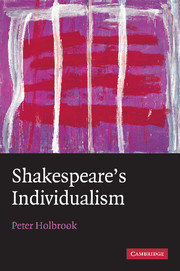Introduction
Published online by Cambridge University Press: 06 July 2010
Summary
Why, thou must be thyself.
The Merry Wives of Windsor (III.iv.3)The nonchalance of boys who are sure of a dinner, and would disdain as much as a lord to do or say aught to conciliate one, is the healthy attitude of human nature.
Emerson, ‘Self-Reliance’(1897), Ralph Waldo Emerson, ed. R. Poirier (Oxford, 1990), 133.Shakespeare is an author for a liberal, individualistic culture. Ralph Waldo Emerson called poets ‘liberating gods’: ‘They are free, and they make free.’ This isn't always true. Yeats and Eliot were authoritarian in outlook, even fascist. But the claim does work for Shakespeare. In 1850 Emerson said Shakespeare ‘wrote the text of modern life’. If we associate modernity with individualism and self-realization, with choice, freedom, authenticity – if modernity means being true to yourself – we can agree with Emerson that the world has been ‘Shakspearized’.
‘Individuality’ and ‘being true to oneself’ seem straightforward enough notions. Individual freedom is being able to act as one wants. But how do I – or you – want to act? What is your authentic, real desire as opposed to a false, fleeting one? All of us, at one time or another, have wanted something very badly, only to find years later (or days…) that our former wish is incomprehensible. ‘What on earth was I thinking?’ we ask ourselves. ‘For I have sworn thee fair, and thought thee bright,/Who art as black as hell, as dark as night’, rues Shakespeare in Sonnet 147.
- Type
- Chapter
- Information
- Shakespeare's Individualism , pp. 1 - 42Publisher: Cambridge University PressPrint publication year: 2010



